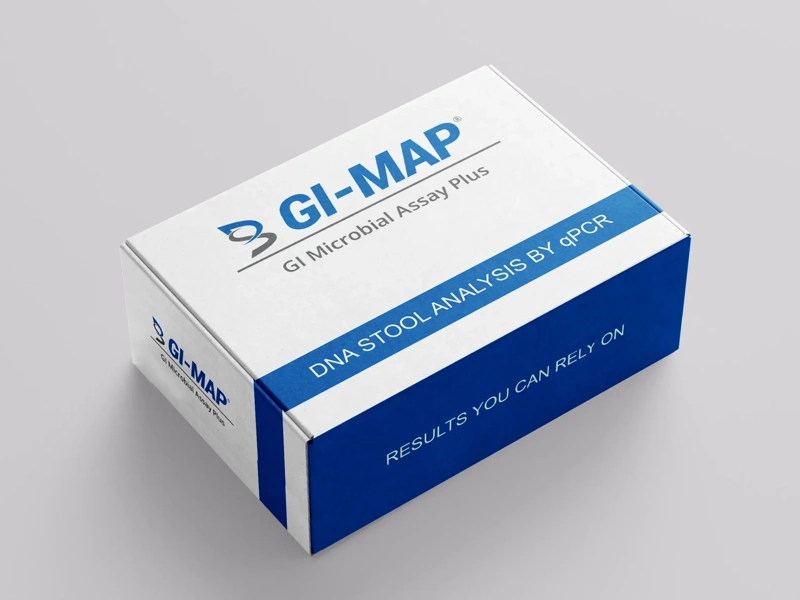
Revolutionizing Gastrointestinal Assessment with GI-MAP
In the landscape of health and wellness, the significance of the gut microbiome is an undeniable force, influencing a myriad of bodily functions from digestion to mental well-being. The GI Microbial Assay Plus, commonly called GI-MAP, stands at the forefront of this exploration, offering an unparalleled window into the complexities of gut health.
The Pivotal Role of the Gut Microbiome in Overall Health
It’s an irrefutable fact: our gut health is intricately tied to our overall well-being. The gut microbiome, an intricate ecosystem within our digestive tract, is pivotal in modulating the effects of our diet and lifestyle choices, affecting everything from nutrient absorption and immune responses to hormonal balance. Recognizing and addressing imbalances within this complex system is crucial in mitigating chronic health issues and fostering optimal health.
Why Choose GI-MAP for Gut Health Assessment?
The GI-MAP test distinguishes itself in comprehensive stool analysis using quantitative polymerase chain reaction (qPCR) technology. This advanced method allows for precise detection of a wide array of organisms, including parasites, bacteria, and fungi, by targeting their DNA. This level of specificity and quantification is unparalleled, making GI-MAP a preferred choice for practitioners aiming to delve deep into the root causes of chronic illness.

Innovations in GI-MAP: Enhancing Patient Health Insights
Gluten Sensitivity Uncovered: Fecal Gluten Peptide Testing
The recent addition of Fecal Gluten Peptide testing to the GI-MAP arsenal provides a powerful tool for identifying “hidden” gluten exposures. By quantifying gluten immunogenic peptides in stool samples, this test offers invaluable insights, particularly for individuals on strict gluten-free diets, pinpointing inadvertent gluten ingestion and facilitating more effective dietary management.
Navigating Antibiotic Resistance: The Universal AR Genes Panel
In an era where antibiotic resistance poses a growing challenge, the Universal Antibiotic Resistance (AR) Genes Panel serves as a beacon of hope. Capable of detecting 55 genetic markers associated with resistance across ten classes of antibiotics, this panel is instrumental for patients with stubborn, chronic infections or those with a history of extensive antibiotic use. Understanding the landscape of antibiotic resistance can significantly refine treatment strategies, offering a targeted approach to combating persistent infections.
Decoding the Significance of qPCR in GI-MAP
The Quantum Leap in Stool Testing: Quantitative Insights with qPCR
The GI-MAP’s reliance on qPCR technology marks a significant advancement in stool analysis. Unlike conventional methods, qPCR provides precise, quantitative data, clearly depicting the concentration of various organisms within the gut. This quantification is crucial for identifying pathogens’ presence and understanding their potential impact on the host’s health, allowing for more nuanced and effective treatment strategies.
The Cornerstones of qPCR: Reliability, Reproducibility, and Clinical Relevance
The adoption of qPCR in the GI-MAP test is not by chance but by choice, reflecting its superior reliability, reproducibility, and clinical relevance. The technology’s high sensitivity and specificity and its ability to yield precise numerical data set it apart from traditional PCR, culture, or microscopy-based methods. Furthermore, the stringent quality control measures and validation processes adhered to by GI-MAP meet and surpass FDA standards, ensuring that practitioners and patients can trust the results.
Personalized Treatment and Retesting: The GI-MAP Advantage
Crafting Tailored Health Strategies with GI-MAP
The detailed insights the GI-MAP provides allow practitioners to craft personalized treatment plans, addressing specific gut dysfunctions and infections. The test’s comprehensive nature ensures no stone is left unturned, whether in identifying urgent infections or optimizing various gut health aspects. Moreover, the ability to quantitatively monitor changes post-treatment through retests offers a clear roadmap of the treatment’s efficacy, guiding further interventions and adjustments.
Who Stands to Benefit from GI-MAP?
Virtually every individual can glean valuable insights from the GI-MAP, whether on a quest for optimal health or grappling with chronic, elusive health issues. The test is particularly beneficial for individuals dealing with conditions such as autoimmune disorders, IBS/IBD, mood disorders, and metabolic issues, among others. Moreover, its application is not limited to adults; infants and children can also benefit, especially in cases related to ADHD, autism, or digestive complaints.
Delving Deeper: What Does the GI-MAP Report Entail?
The GI-MAP report is a comprehensive document detailing the DNA of gastrointestinal microbiota from a single stool sample via qPCR technology. It identifies potential pathogens and offers insights into digestion, absorption, inflammation, and immune function. The report is segmented into detailed pages, each focusing on specific aspects such as bacterial, parasitic, and viral pathogens, providing a holistic view of the gut’s microbial landscape.
The Pathogen Landscape: Understanding the GI-MAP Report
The report segments pathogens into bacterial, parasitic, and viral categories, offering a detailed overview of commonly known gastroenteritis-causing organisms. However, it’s important to note that the presence of these pathogens does not automatically equate to symptoms. Factors like individual health, the transient nature of specific pathogens, and virulence factors all play a role in symptom manifestation.
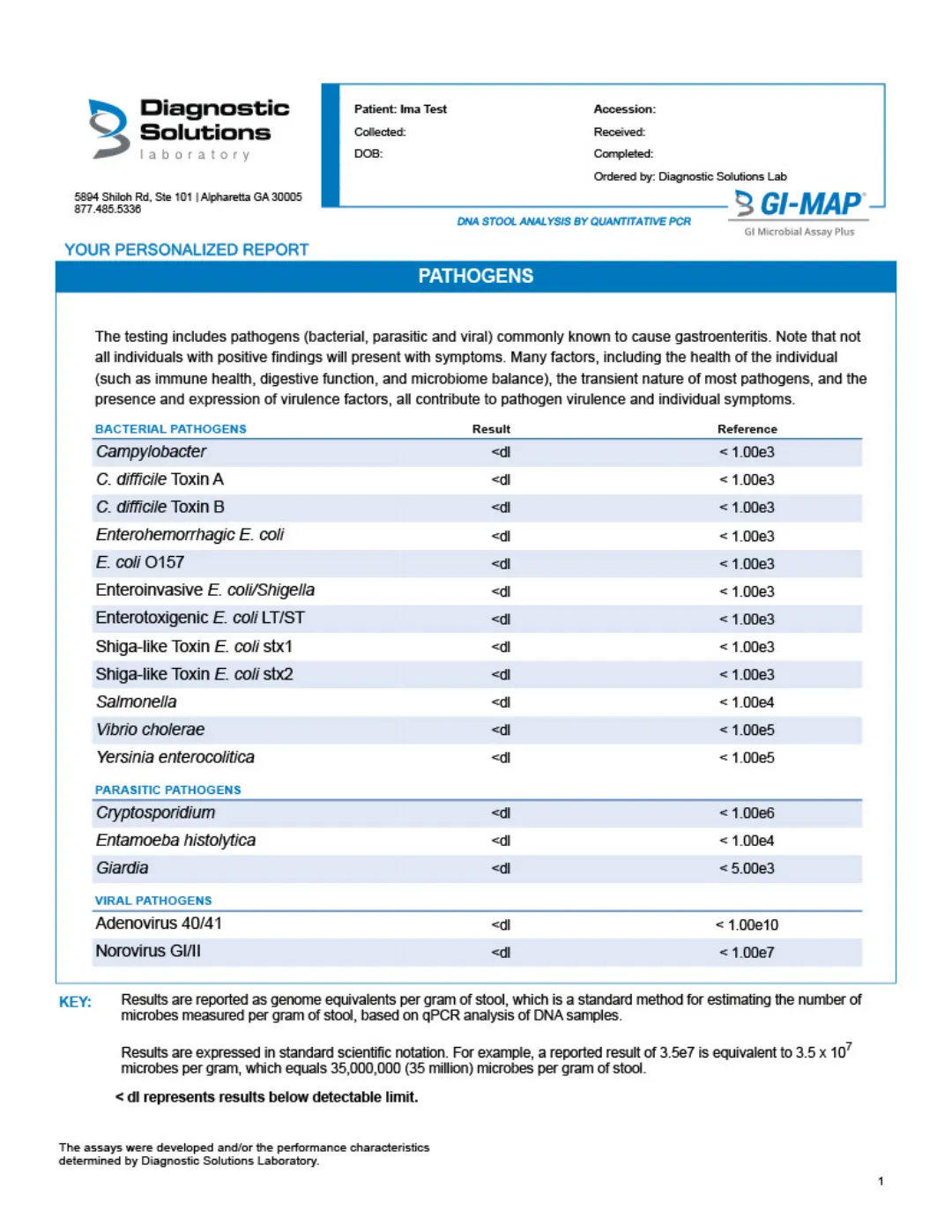
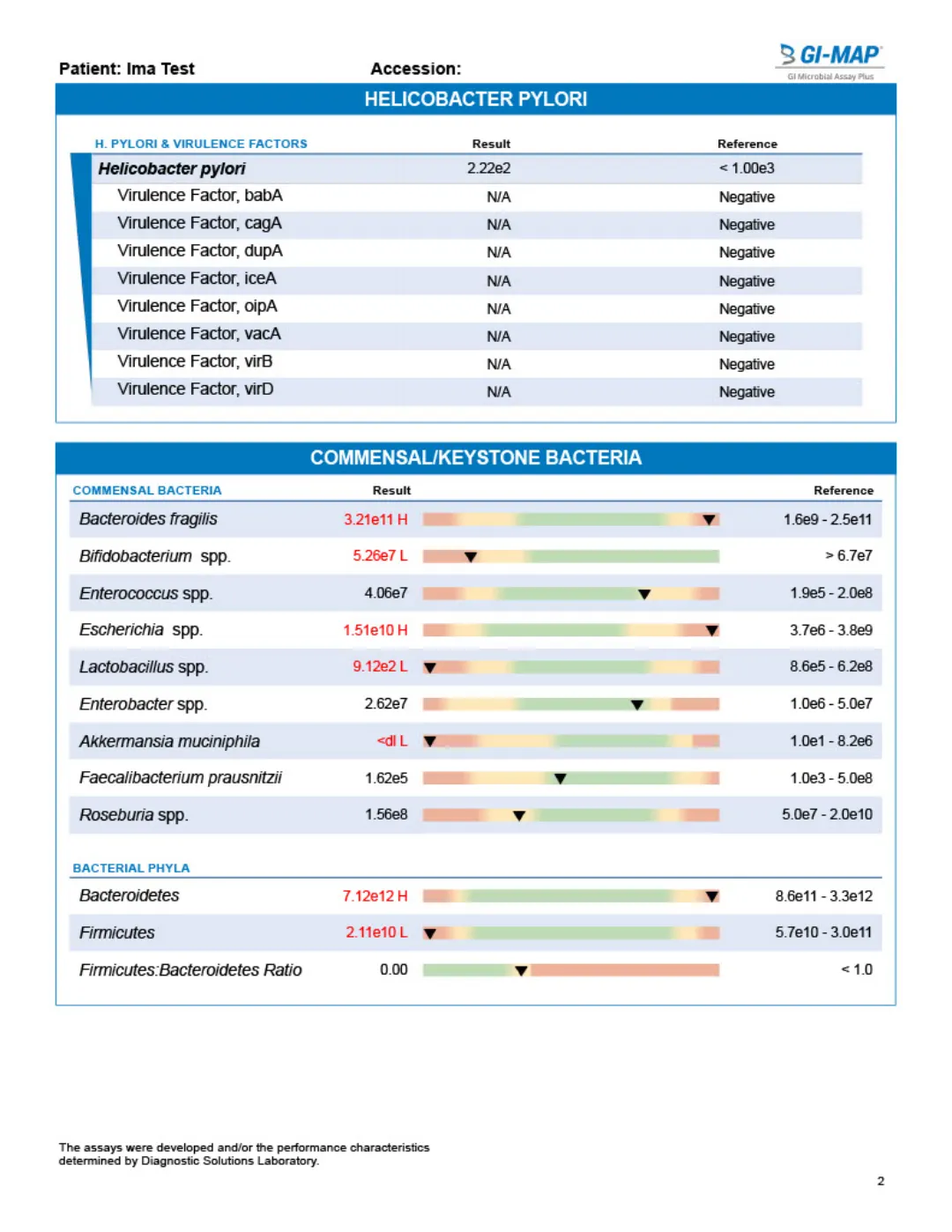
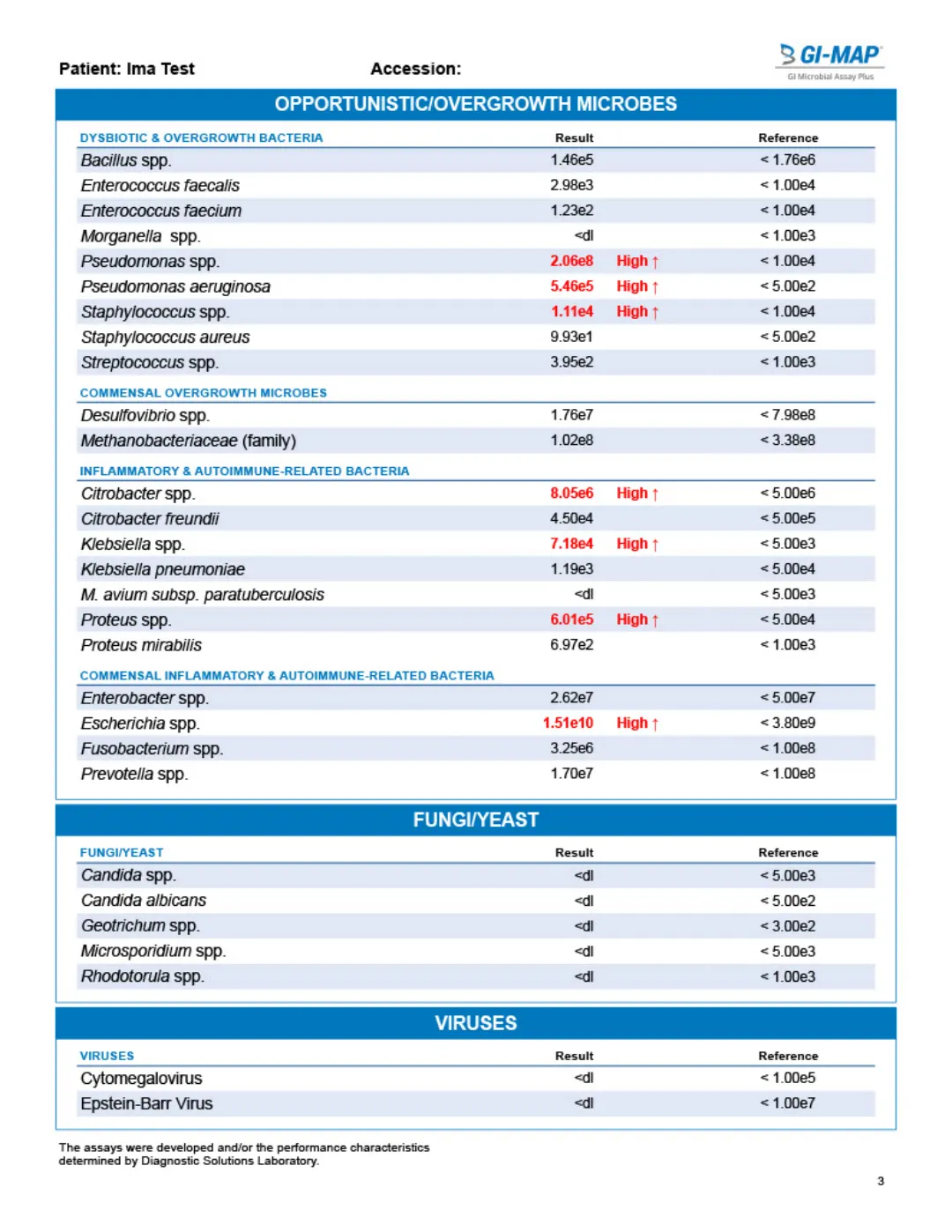
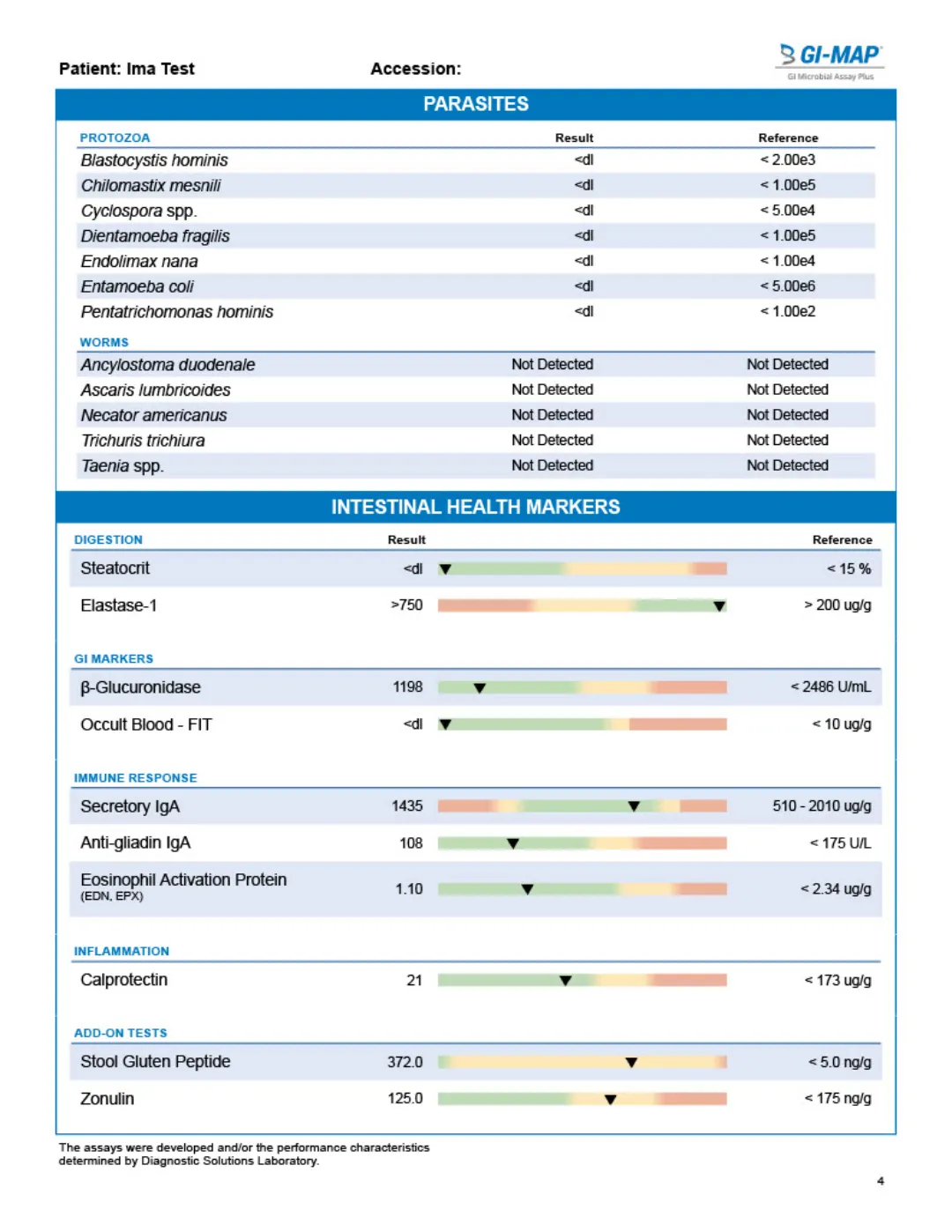
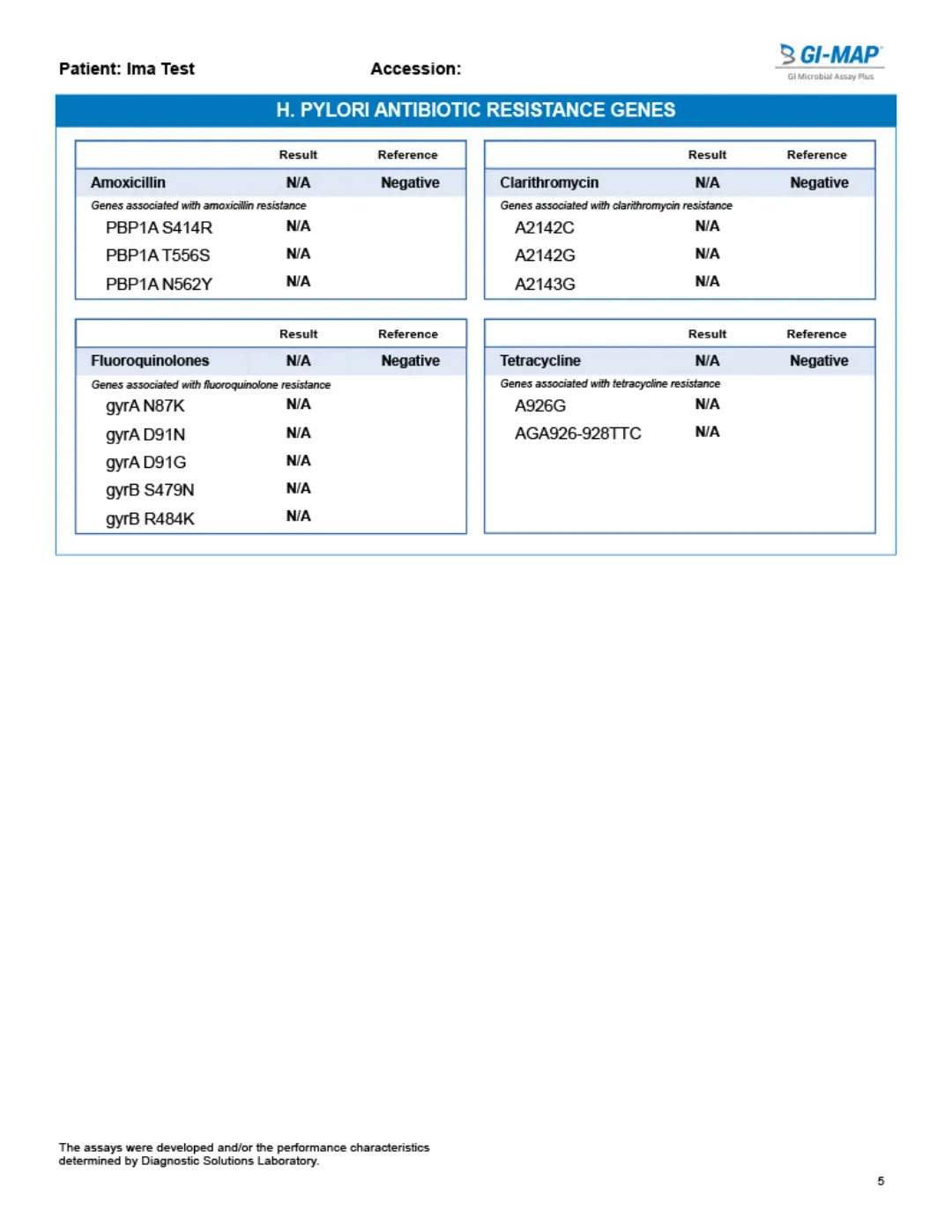
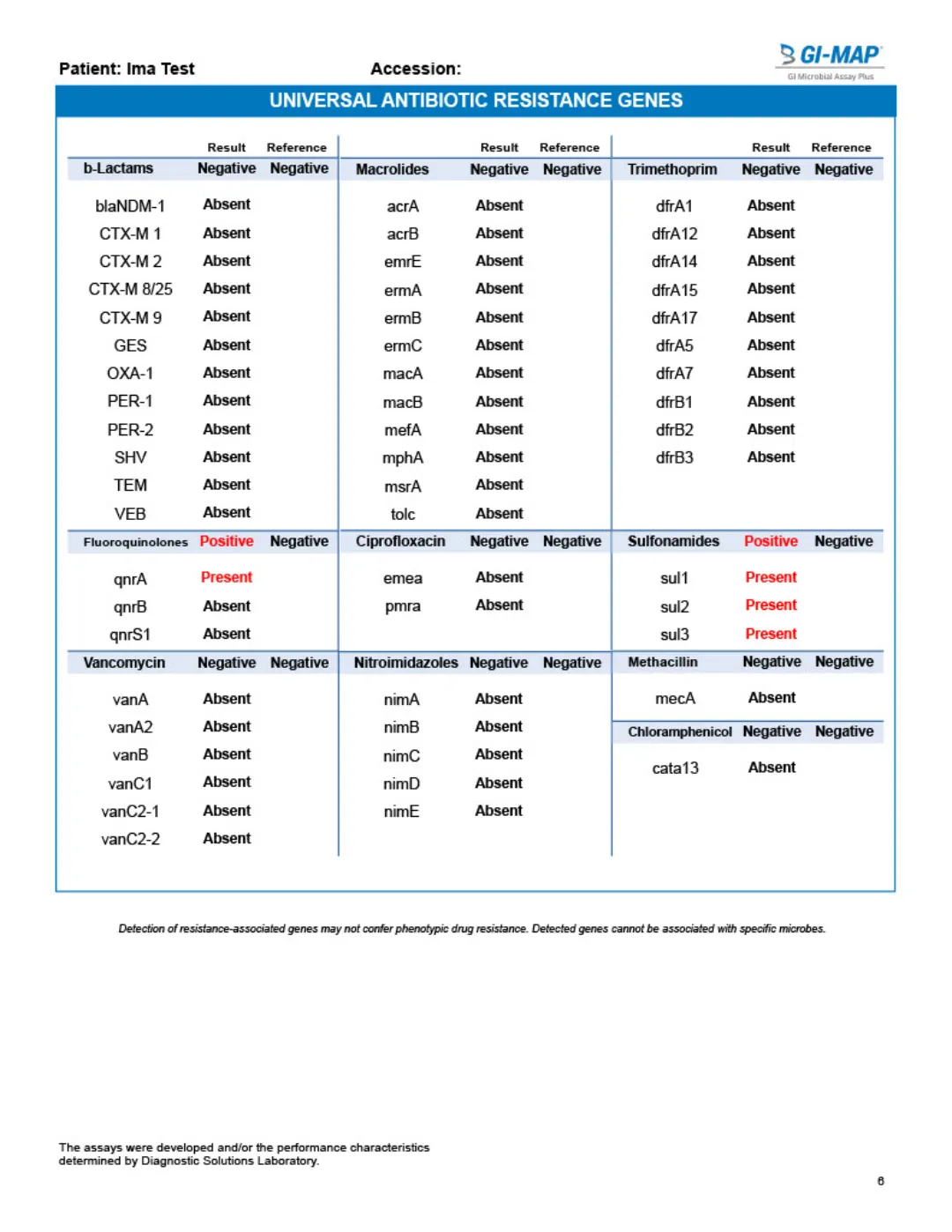
In conclusion, with its advanced qPCR technology and comprehensive insights, the GI-MAP stands as a sentinel in the quest for optimal gut health. Whether for identifying hidden gluten exposures, navigating the complexities of antibiotic resistance, or crafting personalized treatment strategies, the GI-MAP offers an unmatched, detailed, and nuanced understanding of the gut microbiome, paving the way for informed decisions and transformative health outcomes.
Embarking on Your GI-MAP Journey
Partnering with Intrinsic Body Wellness
Teaming up with Intrinsic Body Wellness for GI-MAP testing is seamless, backed by robust scientific literature and advanced testing methodologies. The test is not just a tool but a gateway to improved patient outcomes, as attested by the myriad of practitioners who have incorporated it into their practice.
Ensuring Quality and Excellence: CLIA Certification
Diagnostic Solutions Laboratory’s commitment to quality and excellence is reaffirmed by its CLIA certification. This ensures that the laboratory’s operations meet or exceed the stringent standards set by U.S. regulatory authorities, providing an additional layer of trust and reliability for practitioners and patients alike.
The GI-MAP Difference: A Testimonial to Patient-Centric Care
The introduction of GI-MAP has been a game-changer in health diagnostics. The countless messages from practitioners and patients alike testify to the profound impact a comprehensive stool analysis can have. Each test is not just a procedure but an opportunity to set a transformative journey toward health and well-being in motion.
In conclusion, with its advanced qPCR technology and comprehensive insights, the GI-MAP stands as a sentinel in the quest for optimal gut health. Whether for identifying hidden gluten exposures, navigating the complexities of antibiotic resistance, or crafting personalized treatment strategies, the GI-MAP offers an unmatched, detailed, and nuanced understanding of the gut microbiome, paving the way for informed decisions and transformative health outcomes.
The content provided in this article, including all text, images, and other material, is strictly for informational purposes only. While the information covers the GI-MAP test and its potential benefits, it does not constitute professional medical advice, diagnosis, or treatment. The discussion is not intended to suggest or imply the creation or proposition of individual treatment plans by the author.
As the author, I am not engaged in rendering medical, healthcare, or other professional services through this content. The details shared about the GI-MAP test are meant to foster understanding and knowledge of this particular health assessment and are not to be interpreted as specific medical advice.
I encourage all readers to consult with their healthcare provider, physician, or licensed medical professional regarding any personal health concerns or conditions. No reader should act or refrain from acting based on information provided in this article without first seeking professional advice from a qualified healthcare provider.

